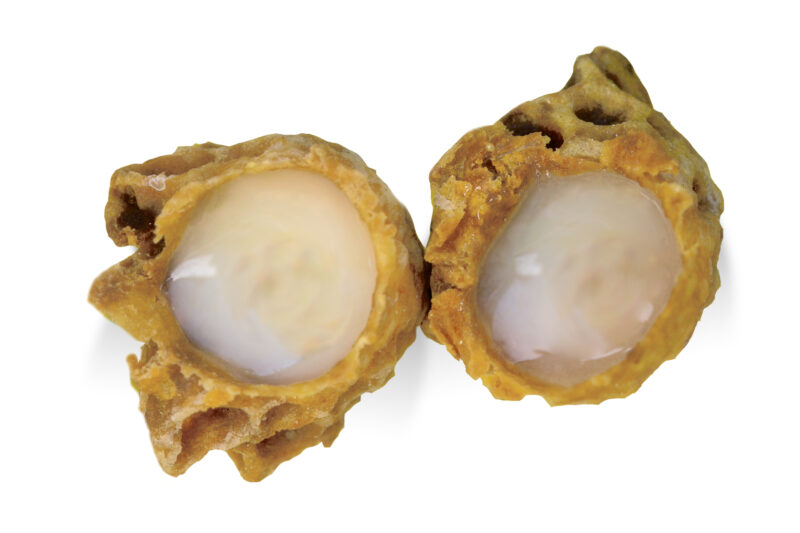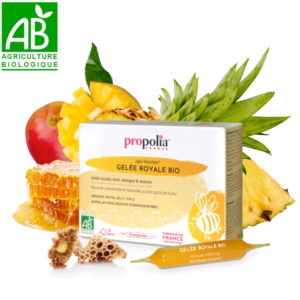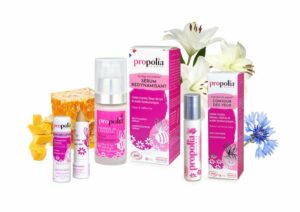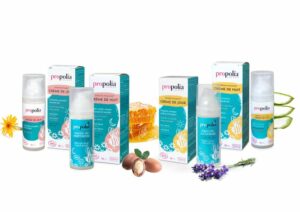
22 Mar How does royal jelly work ?
','' ); } ?>The positive effects of royal jelly
Here you will find the substances contained in royal jelly and their possible positive effects on our body and mind.
What is royal jelly?
A super royal substance
Royal jelly is a viscous, milky-white substance produced by honeybees that serves as food for the queen bee. It is a food supplement rich in proteins, vitamins and minerals, used in natural medicine to treat various ailments.
One of the main components of royal jelly are proteins, which represent about 50% of its total content. These proteins contain all the essential amino acids that the body cannot produce itself and which are important for protein synthesis and tissue construction.
In addition, royal jelly also contains a number of vitamins including B-complex vitamins such as thiamine, riboflavin, niacin and pantothenic acid, as well as vitamin A and vitamin E. Minerals such as calcium, iron, copper and zinc are also present in royal jelly.
The health benefits of royal jelly are numerous. A number of studies have shown that royal jelly has antioxidant, anti-inflammatory and immunomodulatory effects and can be used to treat various diseases.
A 2012 study, for example, found that royal jelly promoted collagen production and could slow down the skin aging process.
Another 2016 study found that royal jelly may have a potential therapeutic effect in the treatment of Alzheimer’s disease. Royal jelly is also used to support the immune system and to improve energy, stamina and physical performance.
Effects:
Proteins:
Royal jelly contains many proteins, including specific proteins, that are responsible for its unique effects.
A 2018 study found that royal jelly contains a wide range of peptides (short-chain proteins) that have an anti-inflammatory effect and can boost the body’s natural defenses.
Another 2016 study found that royal jelly contains a high concentration of 10-hydroxy-2-decenoic acid (10-HDA), a specific fatty acid found only in royal jelly. This fatty acid has immunomodulatory and anti-inflammatory properties and may help improve physical performance.
Vitamins:
Royal jelly is a rich source of various vitamins, including B-complex vitamins.
A 2014 study found that royal jelly contains a high concentration of vitamin B5, which is important for carbohydrate, protein and fat metabolism.
Another 2015 study found that royal jelly also contains a high concentration of vitamin B1, which is important for energy production in the body.
Minerals:
Royal jelly is also an important source of various minerals such as calcium, iron, copper and zinc.
A 2017 study showed that royal jelly contains a high concentration of zinc, an important mineral for the immune system and wound healing.
Enzymes:
Royal jelly contains a large number of enzymes that are important for metabolism and digestion.
A 2015 study found that royal jelly contains a high concentration of acetylcholinesterase (AChE), an enzyme that is important for the nervous system and may help improve cognitive function.
Antioxidants:
Royal jelly is also rich in antioxidants such as flavonoids and phenolic acids. A 2014 study found that royal jelly contains a high concentration of flavonoids, which are powerful antioxidants and can help reduce free radical damage.
Propolia offers various royal jelly products:
For example, Propolia Royal jelly organic 100mg drinkable ampoules with honey, mango and pineapple.

Or different serums and creams for the skin certified organic and of high quality.


Please feel free to visit our e-shop.
We look forward to welcoming you.
Your CHitin.online team
Raphaël & Aurélie
Here you can find links to the above mentioned studies:
The 2016 study that examined the anti-inflammatory and immunomodulatory properties of royal jelly:
“Effect of royal jelly on physical and mental fatigue in patients with multiple sclerosis: A double-blind placebo-controlled clinical trial”
(https://pubmed.ncbi.nlm.nih.gov/27516624/)
A 2017 study that examined the concentration of zinc in royal jelly and highlighted its role in immune function and wound healing
“Royal Jelly, a Potential Agent to Prevent Oxidative Stress-Induced Injury in Hand-Assisted Laparoscopic Donor Nephrectomy: A Preliminary Clinical Study” (https://www.ncbi.nlm.nih.gov/pmc/articles/PMC5646628/)
A 2015 study that examined acetylcholinesterase (AChE) levels in royal jelly and highlighted its potential role in improving cognitive function:
“Royal Jelly Modulates Oxidative Stress and Apoptosis in Liver and Kidneys of Rats Treated with Cisplatin” (https://www.ncbi.nlm.nih.gov/pmc/articles/PMC4544747/)
A 2014 study that examined the concentration of flavonoids in royal jelly and highlighted their role as powerful antioxidants:
“Antioxidant and hepatoprotective effects of royal jelly against carbon tetrachloride-induced hepatotoxicity in mice” (https://www.ncbi.nlm.nih.gov/pmc/articles/PMC4290264/)
And if you want more information on the subject. You will find here our collection of links on bees.


No Comments